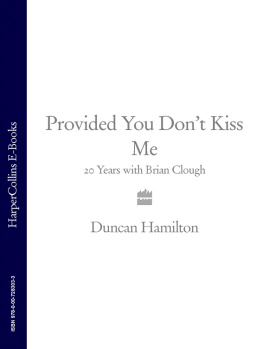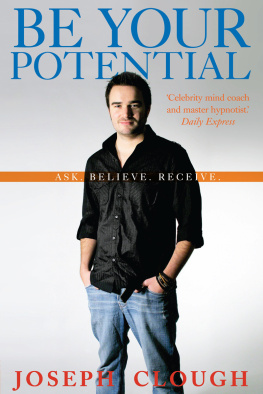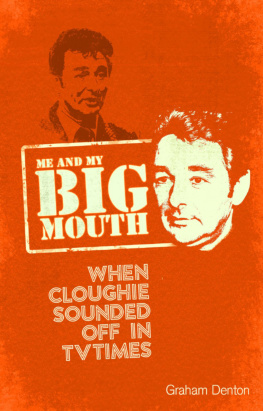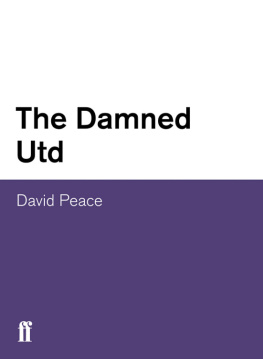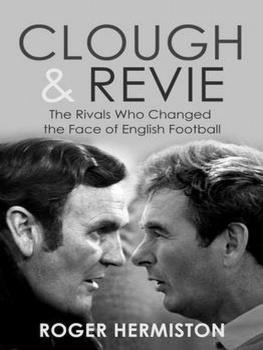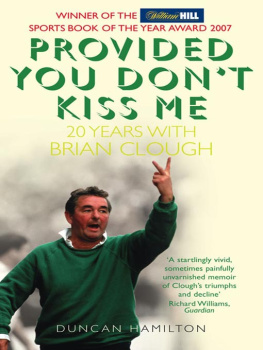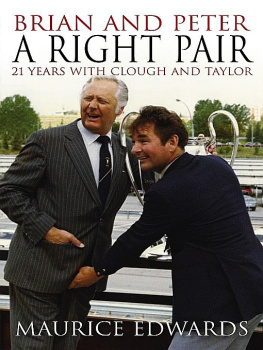If only football could be that much fun
The best account of what it is like to be a football reporter was written by B. S. Johnson, an experimental novelist and poet who regularly covered matches for The Observer. His novel TheUnfortunates, published in the late 1960s, is Johnsons book in a box, an example of modernist literature. It consists of twenty-seven unbound chapters which, except for the first and the last, can be read in any order. The idea, argued Johnson, was to convey the arbitrary nature of thought.
Johnson was a lugubrious man. The Unfortunates is the mournful story of an unnamed narrator (actually Johnson himself) who arrives by train at an unnamed city (coincidentally Nottingham) to cover a football match. He takes a plunge into his past. The surroundings I know this city awaken in him rich slices of memory that rise up and wash over him like waves. And thus, improbable as it may sound, on a grey Saturday afternoon he drifts from meditations on football and football writing into reflections on life and death. Unlike Bill Shankly, he comes to the conclusion that life is more important than football can ever be.
The sections of the book about football are evocative. Johnsons narrator reports on a match between City and United names chosen, Id imagine, because they represent the games Everyman and slowly peels away the misconceptions about the free seat in the press box. Johnson is miserable and unforgiving, and he has an acid tongue.
Given the number of matches a reporter is obliged to sit through over the course of a season in my experience, anywhere between sixty and a hundred and the number of words he has to write about each of them, it isnt difficult to become, like Johnsons character, so disillusioned with the trade that cynicism sets in and hardens like cement.
To the outsider, football reporting, like much of what happens inside newspaper offices, gives off a strong glow of romance and glamour, recalling old movies about the press: a hard-bitten, tough-guy, trilby-wearing Bogart balancing a drooping cigarette on the edge of his lip in Deadline USA, or a workaholic Jack Hawkins beating himself into exhaustion in FrontPage Story. Its a world of typewriters, eyeshades and braces, saloon bars and harassed men in belted trench coats bellowing down black, megaphone-sized telephones to a pouting blonde copy-taker. Amid the clatter of the keyboards and the twisted vines of cigarette smoke, each day is a swirl of gripping, unforgettable events.
If only. The truth, especially in the provinces, is that newspaper reporting is often a mundane, repetitive slog: season after season of unbearably joyless matches, one so indistinguishable from another that it becomes impossible without examining the statistics of teams and goalscorers in Rothmans FootballYearbook to tell them apart. I came into journalism specifically for the free seat. I wanted to watch sport without paying for the privilege, and sports writing seemed like a decent alternative to real work. Soon I began to understand what Robert Louis Stevenson meant when he wrote that it is a better thing to travel hopefully than to arrive.
The beautiful game can seem ugly and dull when viewed through tired and jaded eyes. It looks worse when in early March you find yourself recycling phrases, already soiled by overuse, that you originally wrote in August or September. Worse still, after a while you learn to routinely fabricate an emotional response to something about which you feel absolutely nothing. This is exactly what Johnson conveys so well in The Unfortunates:
Always, at the start of each match, the excitement, often the only moment of excitement, that this might be the ONE match, the match in which someone betters Paynes ten goals, where Hughie Gallacher after being floored nods one in while sitting down, where the extraordinary happens, something that makes it stand out, the match one remembers and talks about for years afterwards, the rest of ones life. The one moment, the one match. A new beginning, is it? But already I suspect the worst have to be prepared, as always, in everything, to settle for less.
Even a cursory flick through Jonathan Coes biography of Johnson, Like A Fiery Elephant, reveals a man not only at odds with life but tragically soured by it. His bitter dissatisfactions, frustrations and, eventually, profound unhappiness led to his suicide in 1973. None of this devalues Johnsons opinions. Whatever his demons, the darts he threw from the pages of TheUnfortunates always fell near, or directly inside, the bullseye. He knew. He had been there and felt it.
When Johnson buys a football paper, bowed by the weight of stale phrases such as star-studded forward line and shooting boots, he says, relieved: I dont have to write that sort of preliminary speculative meaningless crap. Just my own kind of crap.
Handed the attendance figure on a slip of paper, he laments: 24,833 poor sods have paid good money to see this rubbish, and later tartly adds: Not even a bloody quote from the crowd cowed by seeing rubbish like this nearly every week, I should think.
He complains about the press box dirt that blows across my pages and the cramped seat. He is scathing about the Heavy Mob his sobriquet for red-top tabloid reporters, who are castigated as the well paid pseuds armed to the teeth (with) Colour and Metaphor.
Most significantly, however, he puts across the monotonous grind of weekly football reporting and its ritualistic language the words manufactured in a mechanical, depressing way as if by a blank-eyed factory worker turning out rivets. In a single sentence he sums up the way I often felt towards the end of a season, sometimes in the middle of it: Bollocks to this stinking match.
Johnson was lucky he was a part-timer. His football reporting supplemented the serious work of creating novels and poems. Although Johnson complained about it and about the subeditors who, he thought, desecrated his copy with crass, overzealous use of the blue pencil he pressed on with football writing because he was at heart a football man. He arrived at a ground each Saturday hoping that he wouldnt be disappointed again.
How well I knew that feeling. For seventeen years I covered football for two freelance agencies, one national newspaper and for the Nottingham Evening Post. Apart from one season covering Notts County (which, because of its manager, Jimmy Sirrel, was like dropping into the Fifth Circle of Dantes Hell), I followed Nottingham Forest.
A word or two about Sirrel. He looked like a garden gnome that had been roughed up a bit. He had bug eyes and his nose was bent and flat, as if someone had struck him in the face with an iron. I found him devoid of charm and uncooperative, to the extent that I could barely get a word out of him. Once, pleading for a story, I fell back on the weakest of all arguments: Well, Jim, the fans will want to know whats going on. Sirrel, a Glaswegian, replied, Aw, fuck the fans.
My morning phone call to him had previously gone one of two ways.
Morning Jim. Lovely day.
If you think so, you write it, hed reply.
Or, Good morning Jim. Lovely day.
Aye, but not if youre dead, is it, eh?
I couldnt explore the What if scenario with Sirrel either. Aye, hed say, if ma granny had a dicky than she wouldnae be my granny.
I cant imagine that any football reporter has physically strangled to death the manager of the club he covered. But there were a lot of occasions when I would gladly have put my hands around Sirrels neck, squeezed hard and taken my chances. I longed to escape across the River Trent. Thats where you found Brian Clough. Although he was frightening and obstreperous, Clough would give you a line provided, of course, he was prepared to speak to you in the first place. And after that one season covering Notts County, my wish came true.

